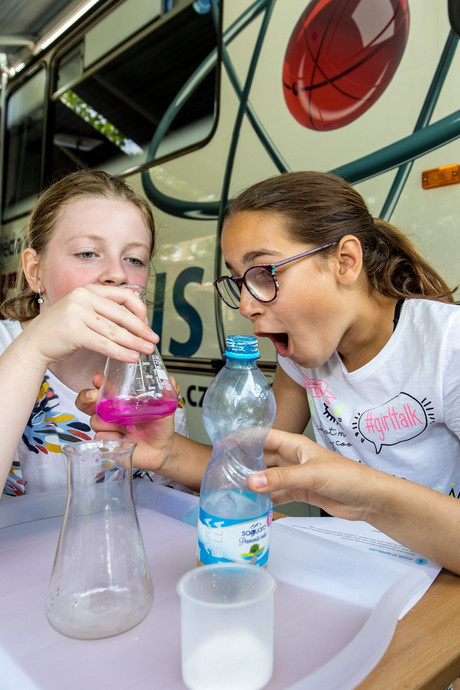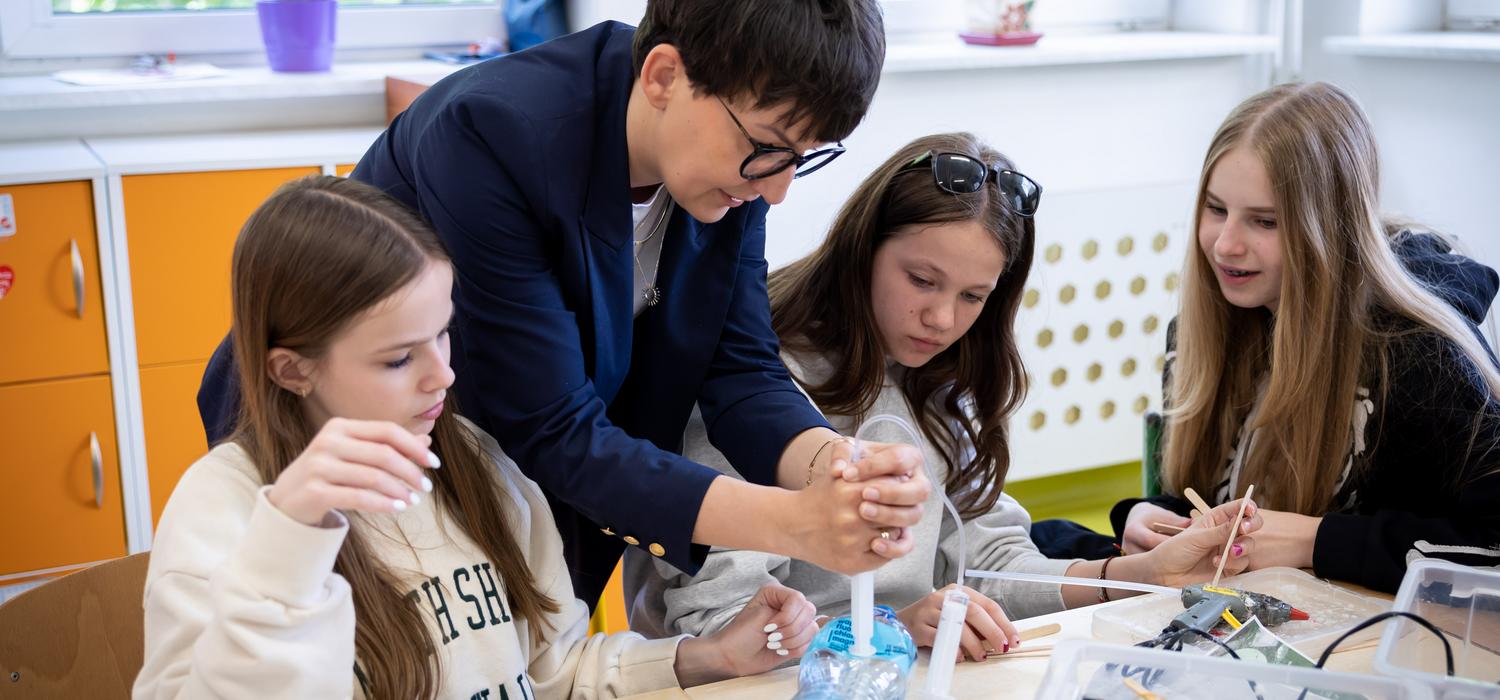


The program supports activities in primary and secondary schools, as well as after-school activities, that equip children and young people with the skills needed to become capable citizens in society. We encourage children’s and young people’s motivation for education, particularly vocational education, ensuring they have the opportunity to acquire the skills needed in the future society. This includes life skills and general transversal skills such as collaboration, critical thinking, creativity, entrepreneurship, and problem-solving as well as skills related to the digital and green transitions.
Some children and young people face particularly challenging life circumstances, leading to unequal opportunities in education and in life. This includes children and young people with immigrant or refugee background and those from socially and economically disadvantaged backgrounds. This program has a special focus on providing at-risk children and youth equal opportunities to become capable citizens. This may include holistic afterschool activities in disadvantaged areas aimed at ensuring a smooth transition to education, or through initiatives that enhance inclusive pedagogy and didactics in schools, providing at-risk youth with the support they need.
The deadline for the ECC call is 29 of January 2025.
In 2025, we fund projects based in Czechia, Hungary, Poland and Slovakia.
We support innovative initiatives which strengthen the social skills of children and young people from disadvantaged areas and support them in completing school and education.
We particularly focus on holistic initiatives that use well-documented methods to enhance young people's opportunities to participate as active citizens while also giving them the best chances of succeeding in education and the job market.
We enhance student-centered pedagogy and problem-based learning. We support the development of new approaches and teaching methods in schools that foster 21st-century transversal skills such as collaboration, entrepreneurship, problem-solving, and critical thinking. We support further education and professional development of teachers to strengthen their competencies within these areas. We also support the development of pedagogical approaches and initiatives that increase the inclusiveness of youth or engage at-risk youth in education.
We fund equipment and facilities that support and enhance innovative approaches in both formal and informal learning environments. This can include makerspaces, workshops, and outdoor learning facilities. However, this must be in conjunction with pedagogical and didactical development. We do not support physical facilities alone, nor do we support property acquisitions or the construction of new properties.
We focus on enhancing the digital competencies of children and young people, enabling them to participate in an increasingly digitalized society. Children and young people must be able to use digital technologies as a central element of their future professional lives and at the same time handle the many challenges that digitalization presents in their everyday lives and work. We welcome initiatives that incorporate digital literacy and digital education as part of their activities.
We fund educational initiatives that address the green transition or sustainable practices in general. This could be broad or locally anchored initiatives focusing on energy, recycling, biodiversity, or green technology. Activities should foster curiosity, train specific skills or provide students with new knowledge.
We prioritise funding projects that have a systemic impact and it is essential to us that project learnings are anchored and continued beyond the project period. The projects must involve relevant stakeholders and partners to achieve lasting systemic change. Furthermore, we encourage projects to share their findings with similar organisations, integrate learnings into legislation or institutional practices, and foster new ways of thinking.
We require projects to follow up on their objectives and results, and to evaluate and communicate their project learnings. Applicants must therefore outline their plans for monitoring goals and measures.
Please note that we do not expect projects to initiate evaluations conducted by external researchers or consultants. However, the foundation may occasionally commission and fund cross-cutting external evaluations, and projects are expected to participate if deemed relevant.
Schools and educational institutions, civil society organisations, local innovators, and public authorities can apply. Applications from individual persons will not be accepted.
Please note that English is our primary language for communications with applicants and grantees. Applications and appendixes must therefore be submitted in English. Communication with project managers and key personnel must be possible in English without interpreters.
We prioritise projects that are:
We encourage collaboration with partners who can provide additional competencies and capabilities.
All types of costs can be included in the project budget, provided they are relevant for the project.
Renovation and construction costs are eligible if they are necessary for the proposed activities and will enhance the sustainability of the activities beyond the duration of our grant.
Fees for consultants, specialists and advisers can be included, such as specialised assistance in relation to tenders, renovation projects, legal compliance etc.
We do not cover VAT costs. Applicants must finance VAT themselves or through other funding sources, unless they are VAT-exempt or can reclaim VAT costs from national authorities.
All interested applicants must submit project proposals through our online application portal which opens early September 2024.
The foundation's application form, budget and CV template must be used. Form and templates are available on the portal.
Yes, but not necessary.
Yes, however we do not consider it likely that projects from countries that are not prioritized, will receive a grant.
Yes. It is possible to include activities in non-prioritized countries, but the justification and added value must be very clear in the application.
The foundation does not support for-profit activities.
No, you have to use the foundation’s application form, budget template, and CV template. You can download the templates from the application portal after login.
No, only a completed application form, budget, CV, and annual report will be available for assessment by the expert committee.
All text entered in the form, including letters, numbers, punctuation, and spaces counts towards the character limit.
That is not necessary, but we encourage formal agreements between collaborating partners. For larger consortiums or collaborations with authorities, letters of support can be helpful information for the foundation. Motivations for collaboration and partners’ roles in projects should be described in the application form.
All projects will have one coordinating organization, which is responsible for the overall financial aspects and reports.
Yes
No, we do not require, that the end target group is able to speak English.
Yes, applicants can register VAT as own-financing/co-funding in the budget.
The ‘Overhead’ budget line covers expenses not directly related to the project activities. It can also cover unexpected expenses which cannot be specified.
Yes
The grant is typically transferred in yearly or half-yearly instalments, always in advance.
May-June the applicants are informed about the outcome of the application. If granted, leave time for paperwork and legal arrangements. 1st of September 2025 is a realistic date to start the project.
We operate with a broad definition depending on a country’s educational system. However, reskilling of young adults is not within scope.
No, but we’ll gladly read a one-page concept note and get back to you regarding if it is a match with the call’s scope.
As part of the registration process, you will be asked to provide information about your region and the target groups your project aims to impact. This information is crucial as it allows us to have immediate access to key data, facilitating more efficient analysis, future promotion efforts and decision-making. While similar details are also requested in the application form, collecting them at the registration stage ensures that we can easily categorize and track regional and demographic focus areas without having to manually extract this information later. This helps streamline our processes and supports better alignment of our funding strategy with regional needs and target group priorities.